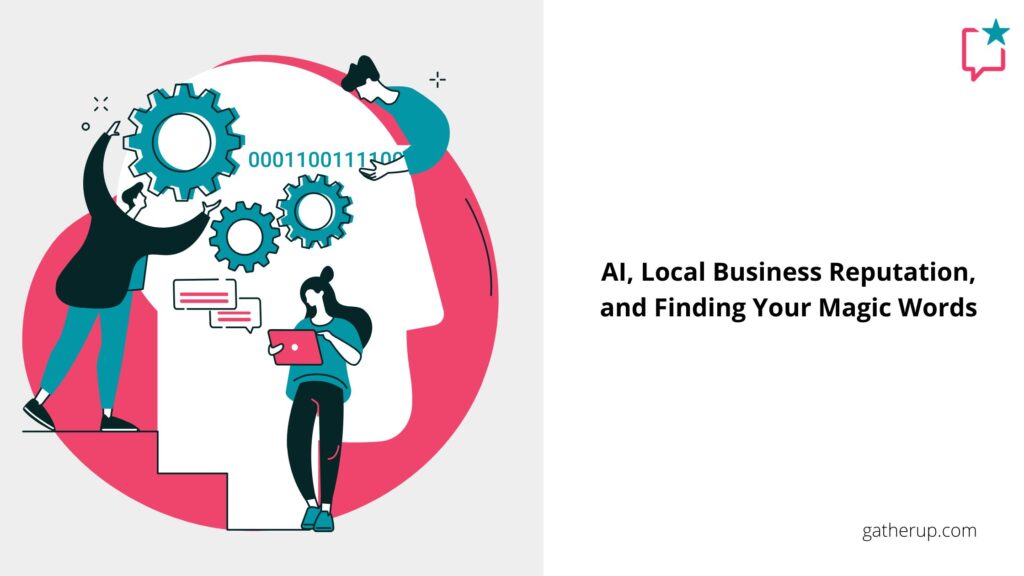
“How can I show up in ChatGPT and other AI applications?” everyone is asking, and the answer could be found in a phrase you may have heard from your parents in childhood:
“You forgot to say the magic word.”
In this case, the magic word isn’t “please”, but with ChatGPT reporting 300 million weekly users by the close of 2024 and AI Overviews cropping up like toadstools after a rain all over the Google forest, local brands large and small are understandably eager to know how to be included in the outputs of these products.
The answer to this FAQ is simpler than you think: you need to find your magic words, and I’m going to show you how to do this in today’s column.
Did you catch what Rand Fishkin said?
Speaking of magic, there’s a reason I’ve spent the last few decades listening carefully to the man who was known as the Wizard of Moz while he piloted the SEO company he co-founded and who continues to lead major industry conversations as Sparktoro’s CEO. It isn’t just because I worked for Rand Fishkin, or because he’s been such a kind mentor to me over the years. It’s because he has a habit of making marketing confusion magically disappear, replacing it with simple explanations and practical advice. This is exactly what he recently did in this Linkedin video in answer to the big question of how to get included in AI-based results.
I highly recommend watching the whole video, which Rand begins by giving a big thumbs down to an AI Overview explanation of how to appear as a ChatGPT result:
I get a similar dubious answer saying “content is king” when I do the same search:
For the sake of the local businesses you’re marketing, don’t listen to these generic, misleading answers. Instead, Rand explains, AI mediums like ChatGPT focus on:
“Words that come after other words on the internet.”
He then demonstrates searching for the exact wording on the bio page of Sparktoro (highlighted in blue):
This search brings up hundreds of organic results that have quoted this phrasing verbatim from Rand’s bio in publishing information about him. Wherever Rand appears on a podcast, at a conference, a website, or a video channel, he asks the publisher to use this language about him and his brand. He’s grown a big digital footprint for the words “Sparktoro, makers of fine audience research software.”
Sounds good, right? But the problem is, when Rand asks ChatGPT to recommend “audience research tools”, his product isn’t included, because those aren’t the words he’s promoted. Instead, he’s a top result for “audience research software”. The solution? Rand says,
“If I wanted to show up for tools, I should change that (bio wording)….We know exactly what to do. We know, thanks to folks like Stephen Wolfram, how these systems work. We know we can influence them, and almost no one is doing it. It really bothers me. It bothers me how much we have conversations about appearing in AI and how few people do what is essentially Public Relations work: getting your word and your brand to appear next to other words frequently across the web in all these places so you get picked up by an LLM.”
So, hey, presto! Thanks to educators like Rand Fishkin, we all understand that when it comes to AI environments, we need to be thinking about:
- Simple word choices
- Good old fashioned digital PR
Finding your own magic words
Let’s get right to the heart of this by having you answer three short but vital questions:
- What is the core wording the local business you’re marketing needs to be known for?
In most cases, this will not be a slogan. For example, the US company Safelite has a well-known jingle that appears in all of its TV and radio ads which sings, “Safelite repair, Safelite replace.” While that’s fine, these are not the words a brand like this should be thinking of as its magic words because the jingle completely neglects to state what the business repairs and replaces. Instead, its magic words would probably be something like “Safelite repairs and replaces car windshields.” If you distill your own message down to a brand name and a few words that succinctly describe your core offering, what are your magic words?
- Have you double-checked that you’re right about your magic words?
Also speaking of magic, chances are good that you’ve seen Peter Jackson’s “The Lord of the Rings” trilogy, given that it’s one of the highest-grossing film series of all time, and you likely remember the scene in which Gandalf cannot figure out how to open the enchanted doors of Moria, no matter which words he uses. All too often, local businesses I’ve consulted with are in a similar position, failing to hit on the right terms for opening the doors to their intended audience because they aren’t reflecting how their audience actually searches. Frequently, their marketing is filled with insider terminology that the public simply doesn’t use.
In seeking inclusion in AI results and outputs, you need to be sure that your magic words are the ones members of your community are most likely to use in trying to find what your local business is and does. You can get the best insight into this via:
- Using keyword research tools to identify popular search language
- Looking up the words you think are the best, but then looking at Google’s “People also ask” boxes to see if there is an alternative wording that might be better
- Practicing active social listening in places like Reddit to see if there is some way communities are discussing goods and services like yours that hadn’t occurred to you
- Conducting a survey of your community to identify how people word their descriptions of what your business is or does
- Running a poll on social media, asking participants to choose between 2-3 phrases that they would most likely use in searching for a business like yours
- Recording call log information that captures how people request assistance from your brand (e.g. “I need my cracked windshield repaired or replaced”)
- Analyzing your recent review corpus to identify how reviewers talk about what your business is and does
Don’t just assume that you already know what your magic words are. Put in the research so you can base your choice on data and open your company’s doors wide for your community.
- Which search terms are bringing up your competitors in AI outputs?
We’re in the early days of AI competitive analysis, but you can get started by searching for the terms you’ve identified as important and seeing what your competition looks like in environments like ChatGPT and AI Overviews. If you find a dominant competitor or two, you can then assess the efforts they’ve been making to grow their digital footprint for their magic words, and that brings us to the work ahead of you.
Finding the right local business PR opportunities
If you watch Rand Fishkin’s video on Linkedin, you will see how he has earned hundreds of the kinds of references we would refer to in the local SEO industry as “unstructured citations” – mentions of him and his brand outside of formal local business listing indexes. In the emergent AI dynamic, your goal will be to earn and build as many unstructured citations as possible that include your magic words.
It can be useful while doing your AI competitive research to note down any sources being cited from which AI is already pulling information, but your marketing activities will basically come down to enlarging your online presence for your chosen words in as many ways as you can, including:
- First-party content you publish on your own website
- First-party content you publish on your social media channels, including video channels like YouTube
- Third-party review content on major local business listing platforms (GatherUp can help with this!)
- Appearing as a guest on podcasts, video channels, blogs, or any third-party publication that can be scraped so that the way in which you are being cited with your magic words gets picked up
- Sponsoring local events, teams, and other institutions that will allow your brand to be cited along with its magic words
- Speaking at local or industry events that include online speaker bios
- Cross-promoting with fellow local business owners who are willing to collaborate on mutual publication of one another’s magic words
- Ensuring that your business descriptions on traditional local business listing indexes include your magic words
- Publishing formal press releases that include your magic words in their headlines and content
- Finding a newsworthy angle about your magic words and pitching it to local online news reporters
- Participating in scrapable social media conversations with a mindfulness about your magic words
This is just a starter list that I hope will get you thinking creatively about why the way you talk and write about your company’s USP is becoming ever more important in our present AI-frenzied era.
AI, as a technology, continues to have many shortcomings and ethical concerns associated with it, and if you are not a fan, it may be helpful to think of it this way: though AI may mislead and confuse the public with its hallucinations and shallow information, if you can be in its results, it will bring members of your community one step closer to being personally served by your local business with care and respect. That’s a good thing. And with some research and mindful PR, your local business can work a little practical magic.
